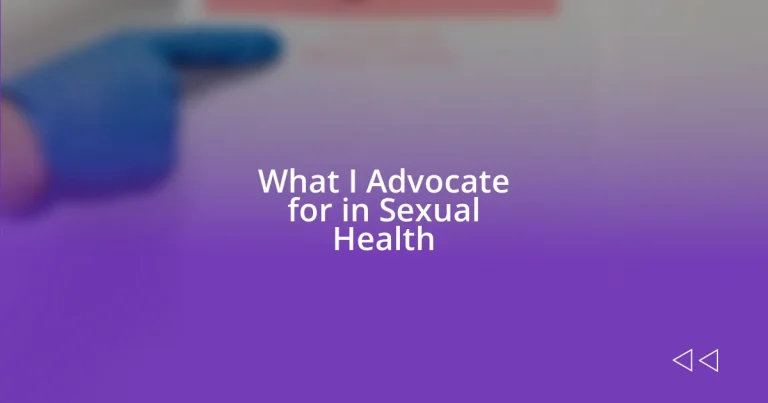Key takeaways:
- Sexual health advocacy is essential for empowering individuals, fostering open discussions, and promoting accessible care, contributing to systemic change.
- Comprehensive sexual health education is crucial, focusing on biological, emotional, and social dimensions while being age-appropriate and inclusive to combat misconceptions.
- Addressing stigmas and advocating for inclusive policies are vital to ensure that everyone feels supported in their sexual health journey and has access to necessary resources and services.
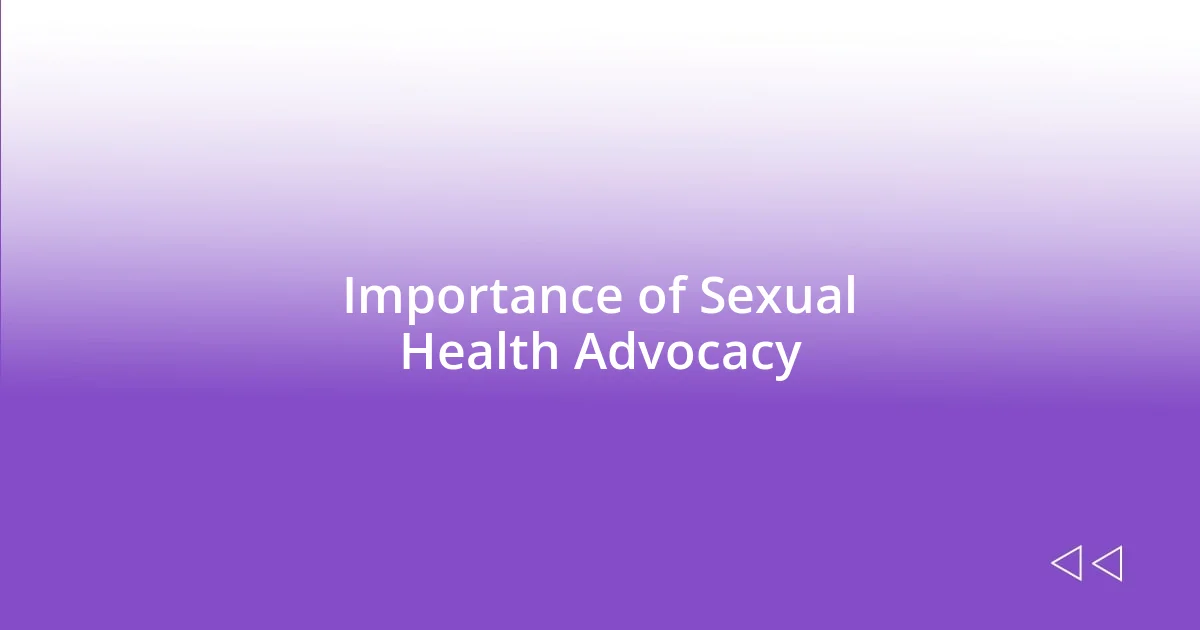
Importance of Sexual Health Advocacy
Advocating for sexual health is vital because it empowers individuals to take control of their bodies and well-being. I remember a time when a friend hesitated to seek help for a health concern because they felt embarrassed. It struck me how stigma surrounding sexual health can prevent people from accessing crucial information and resources. Isn’t it disheartening that many people still feel subjugated by shame instead of feeling supported by advocacy?
Moreover, sexual health advocacy fosters open discussions, breaking down the barriers of misinformation and fear. I’ve participated in workshops where people freely shared their experiences, leading to moments of vulnerability and connection. Those discussions not only educated us but also highlighted a collective journey towards understanding and acceptance. How can we underestimate the power of community in shaping healthier attitudes towards sexual health?
In addition, these advocacy efforts can lead to significant policy changes that enhance accessible care and education. When I see campaigns successfully influencing lawmakers to support comprehensive sex education, it gives me hope. It’s a reminder that every voice counts in creating systemic change—don’t you think we should all be part of that movement?
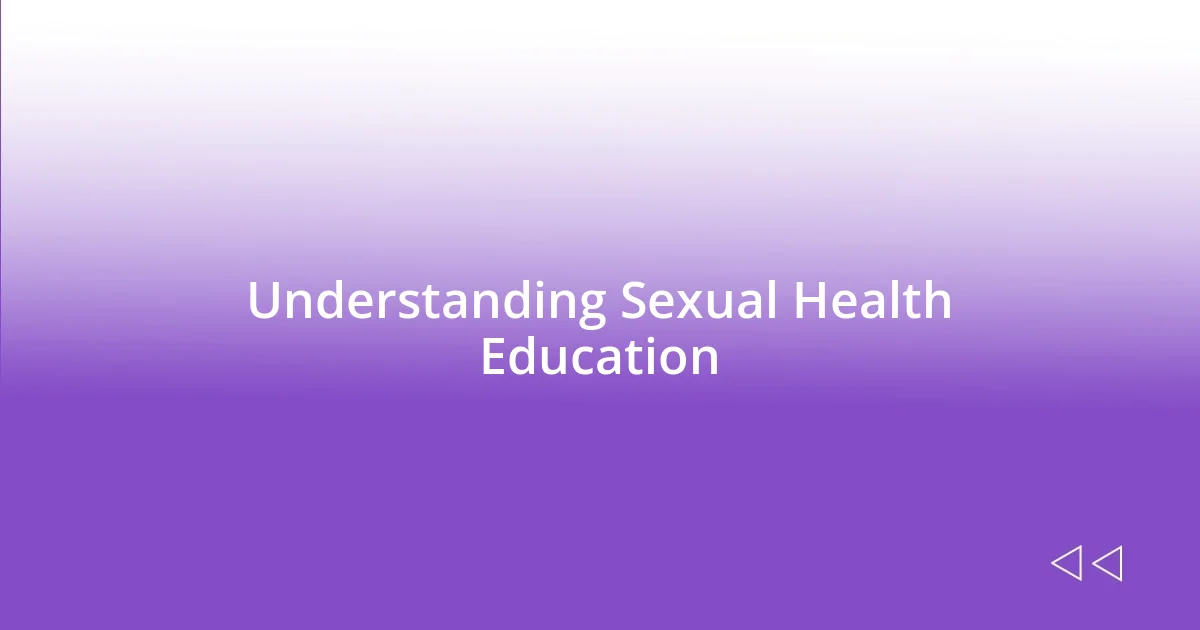
Understanding Sexual Health Education
Understanding sexual health education is crucial for fostering informed communities. When I was in high school, I often found myself puzzled by the limited conversations surrounding sexuality. I recall a particular class that merely scratched the surface, leaving many of my peers to search online for answers—often leading to inaccurate information. Isn’t it alarming how a lack of comprehensive education can breed misconceptions and anxiety?
Effective sexual health education encompasses not only the biological aspects but also emotional and social dimensions. I’ve witnessed firsthand how inclusive programs can transform perspectives. For instance, during a workshop on consent, participants shared stories that brought home the importance of understanding boundaries. Those moments taught me that education shouldn’t just be informational; it should resonate on a personal level, creating empathy and understanding among individuals.
Moreover, I believe it’s essential that sexual health education becomes age-appropriate and relevant to diverse experiences. Reflecting on my own learning journey, I recognize the value of tailoring educational content to meet different needs. By doing so, we not only build knowledge but also nurture a culture of respect and acceptance for all individuals. Isn’t it inspiring to think about the potential impact of well-rounded educational initiatives?
| Aspect | Description |
|---|---|
| Content Scope | Covers biological, emotional, and social elements of sexual health. |
| Accessibility | Ensures information is suitable for all age groups and diverse backgrounds. |
| Methodology | Utilizes interactive, engaging methods like workshops to promote understanding. |
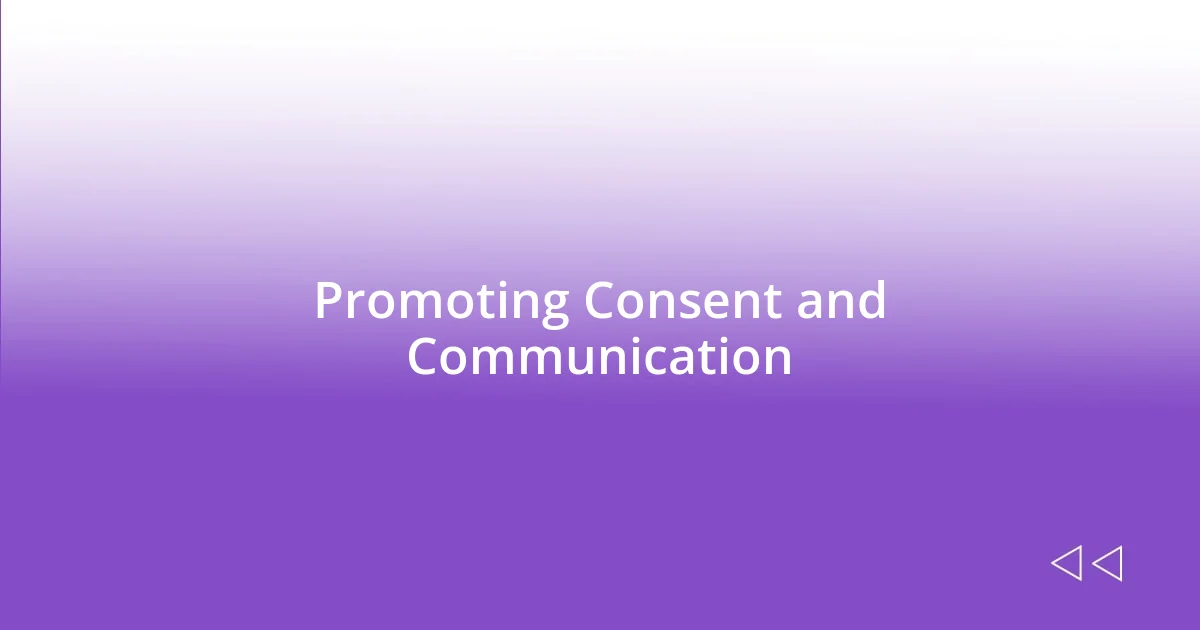
Promoting Consent and Communication
Promoting consent and communication is foundational to healthy sexual relationships. I remember attending a seminar where the emphasis was not only on saying “yes” but also on the importance of clear, ongoing dialogue. When everyone involved is encouraged to express their feelings and boundaries, it creates a safe environment to explore intimacy—don’t you think that’s a vital aspect of any relationship?
Effective communication can take many forms. Here are some key elements I believe are crucial for fostering consent:
- Active Listening: Engaging attentively to understand your partner’s feelings and concerns, not just waiting for your turn to speak.
- Check-Ins: Regularly asking for feedback during intimate moments can reaffirm boundaries and ensure comfort.
- Language Sensitivity: Being mindful of how language can impact understanding, recognizing that terms may differ in meaning for individuals.
- Promoting Affirmative Consent: Encouraging the idea that consent is not just the absence of a “no,” but an enthusiastic “yes” from everyone involved.
- Non-Verbal Signals: Awareness of body language can often communicate as much as words, helping to gauge comfort levels.
It’s fascinating how simple but effective strategies around consent and communication can deepen intimacy. I once shared a moment with a partner where we took the time to discuss what we both enjoyed, leading to a much richer experience. Those conversations nurtured trust and reduced anxiety, reminding me that sexual health is as much about emotional connectivity as it is about physical interaction. Isn’t it enlightening to think that such dialogues can transform our understanding of consent into a shared journey?
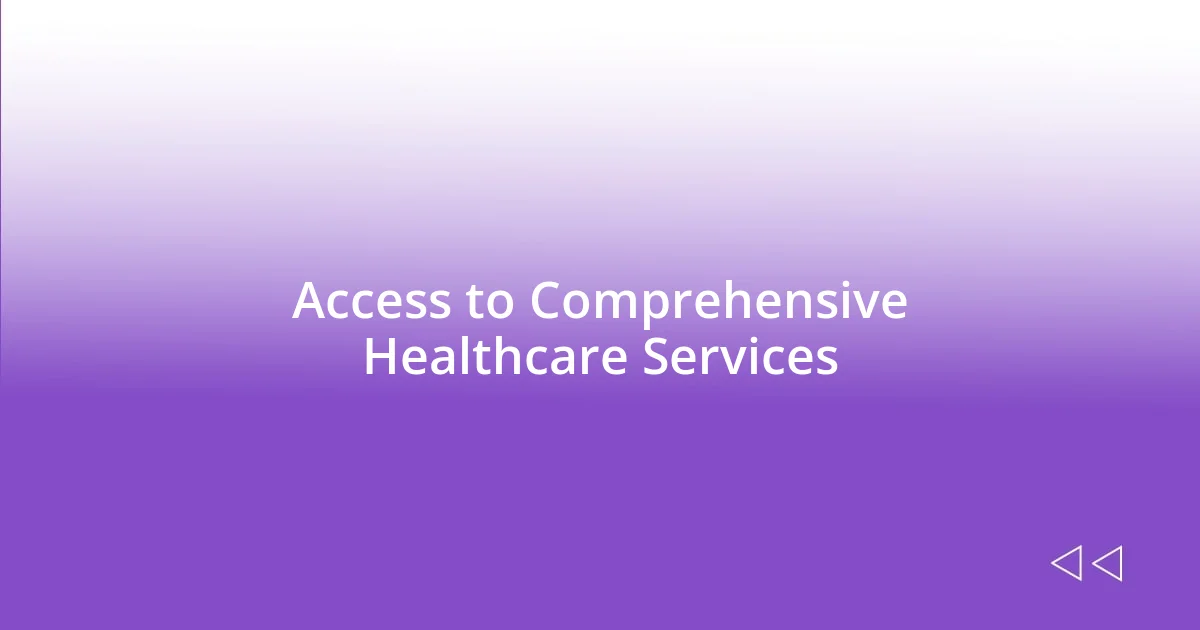
Access to Comprehensive Healthcare Services
Access to comprehensive healthcare services is essential for promoting sexual health and well-being. I remember a time when I had difficulty accessing information about sexual health services in my area. It felt overwhelming to navigate different clinics and providers, and I often wondered—how many others face similar barriers?
The reality is that not everyone has equal access to the comprehensive services they need. In my experience, when healthcare services are limited, it can lead to missed opportunities for crucial screenings and preventive care, which are vital for maintaining sexual health. For instance, I once coordinated a community health fair that offered free screenings, and the turnout was incredible. It reinforced my belief that when healthcare is made accessible, people are more likely to take charge of their sexual health.
Moreover, universal access to comprehensive sexual healthcare is not just a personal concern, but a community issue. I think back to conversations I’ve had with friends who didn’t realize the extent of services available to them, from STI testing to reproductive health care. It’s a shared responsibility to ensure that everyone knows about and can easily access these vital services—after all, how can we advocate for better sexual health for all if we don’t address accessibility in a meaningful way?
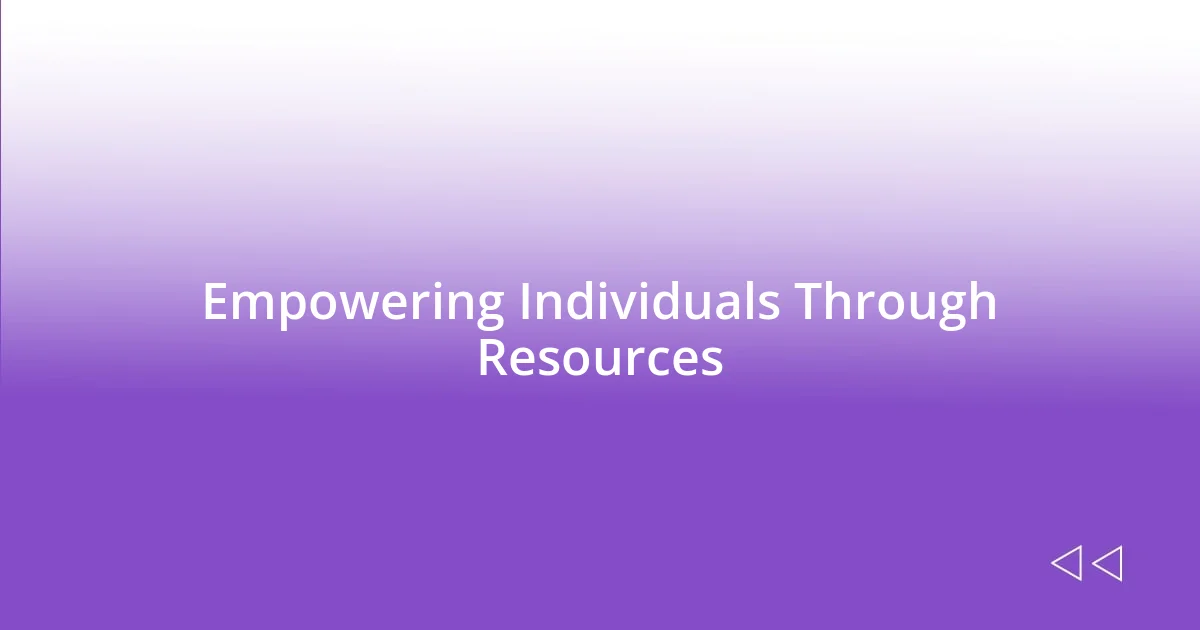
Empowering Individuals Through Resources
Empowering individuals through resources is key to fostering healthier sexual health practices. I vividly recall a workshop where we were introduced to various digital platforms offering sexual health education. The access to reliable information transformed my understanding; it really made me wonder — how many people are still relying on outdated or incorrect resources? With just a few clicks, individuals can find tailored advice, support groups, and even local services, which can significantly enhance their confidence in making informed choices.
Having these resources readily available can bring empowerment to many. I can still feel the excitement in the air when I helped a friend navigate an online portal dedicated to sexual health. Seeing her gain clarity about her options for contraception and STI testing was so rewarding — it was as if a weight lifted off her shoulders. When we equip people with the right tools, it lifts the stigma and fear surrounding sexual health discussions, allowing them to take proactive steps.
At the same time, I believe that educational resources should go beyond the basics. For people who may have felt isolated in their experiences, connecting with support networks can be life-changing. I remember consulting a local community group that offered peer-to-peer support, which emphasized sharing personal experiences. The sense of belonging was palpable, making me reflect: isn’t it incredible how such connections can inspire individuals to advocate for their needs and the needs of others in their community?
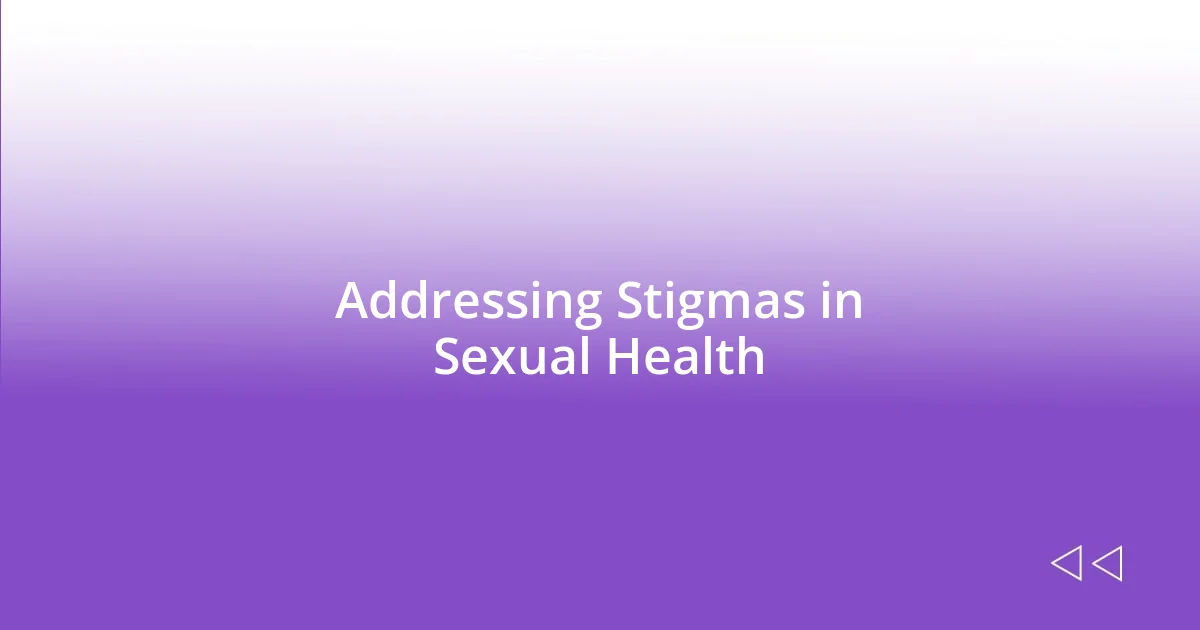
Addressing Stigmas in Sexual Health
Addressing stigmas in sexual health is a multifaceted challenge, and I’ve often encountered how powerful misconceptions can be. I remember overhearing a conversation at a local café where someone dismissed the importance of routine STI testing, equating it with promiscuity. In that moment, it struck me how crucial it is to dismantle these harmful ideas. When societal norms frame sexual health discussions as taboo, individuals may feel ashamed to seek help, leading to detrimental consequences.
I often reflect on workshops where we talk openly about sexual health topics—those spaces create transformative moments. I recall a time when we shared personal stories, and even the most hesitant participants opened up. It was in those exchanges that I saw how addressing stigmas can foster understanding and connection among participants. Isn’t it fascinating how vulnerability can lead to empowerment? By normalizing these conversations, we not only educate ourselves but encourage others to approach sexual health without fear or shame.
We must work collectively to change the narrative around sexual health. Just last year, I volunteered at a local high school, speaking with students about safe practices and consent. What surprised me most was their eagerness to learn, coupled with their apprehension about discussing it with peers. This experience illuminated the need for ongoing dialogues not just in classrooms, but in every community. If we can promote acceptance and awareness, we will create a healthier, more informed society where no one feels isolated in their sexual health journey.
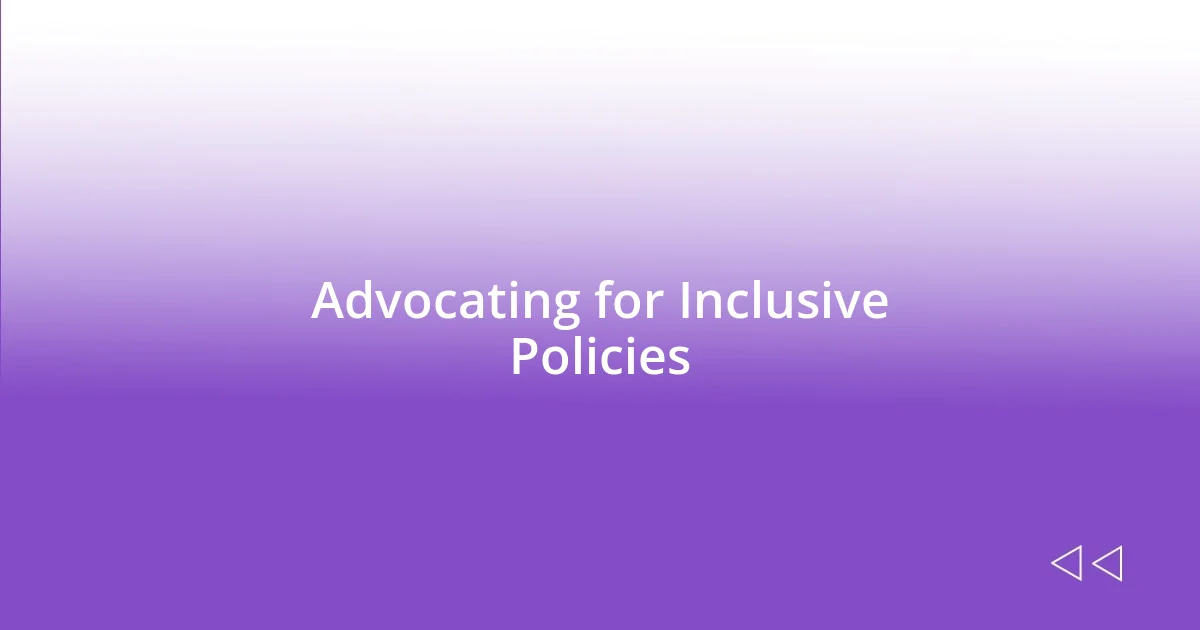
Advocating for Inclusive Policies
Advocating for inclusive policies in sexual health is crucial for creating a supportive landscape where everyone’s needs are met. I remember a time when I attended a town hall meeting focused on improving health services. It was eye-opening to witness communities coming together and demanding that policies reflect diverse sexual health needs — from comprehensive sex education to access for marginalized groups. Isn’t it inspiring when people unite for a common cause?
During one of those discussions, a participant passionately shared their experience navigating a healthcare system that was far from inclusive. I could feel the anger and sadness in their voice, which reminded me just how essential it is to ensure that all voices are heard. I often reflect on how inclusive policies can pave the way for better healthcare, making sure no one is left behind simply because of who they are or where they come from.
I find it incredibly motivating to think about how these policies can transform lives. On a personal note, I’ve seen the impact of inclusive initiatives firsthand. Volunteering with a local LGBTQ+ wellness group, I witnessed how inclusive health policies encouraged a young person to seek support they desperately needed. That moment was a stark reminder: we can’t afford to ignore anyone’s health; we must advocate for solutions that encompass all identities and experiences in our society.












